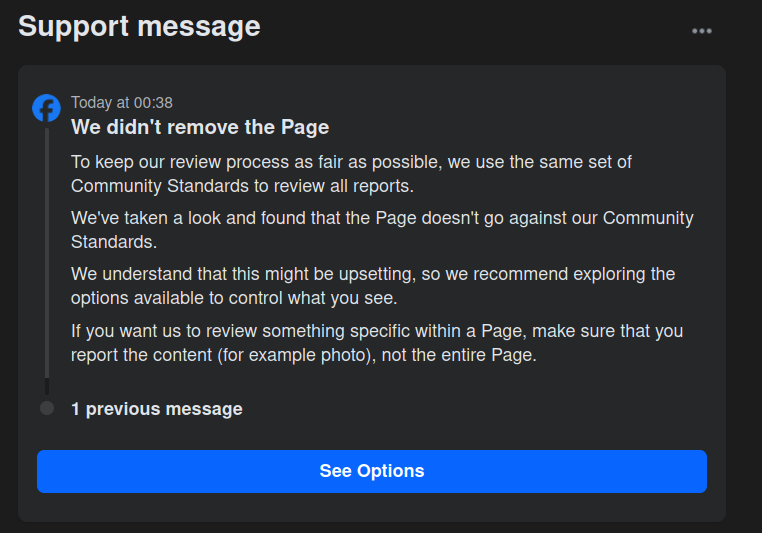Facebook’s New Low: Ads Disguised as Posts, Lead to Scams
Facebook responce to the scam ad getting reported. (They don't care)

These ads aren’t just disguised as regular posts—they’re often clickbait designed to shock and make you want to click to learn more. At first glance, they seem like harmless posts, but once you click, you’re redirected to a scam page with a fake "virus" warning. These ads typically come from new accounts with little activity, making them harder to identify. If you’re not familiar with these types of scams, it’s easy to get fooled. The best advice? Avoid the Facebook feed altogether and stick to messaging. Stay safe!
Wow. Facebook has really sunk to new lows lately. They've started running ads that look just like memes. At first glance, they seem harmless, maybe even funny. But the moment you click on one of them, you're hit with a shady page that tries to scam you with a fake "virus" warning. It’s honestly insane that a platform this big is now allowing this kind of thing to happen, just for the sake of making a quick buck.
Be extra cautious, especially if you're showing this to older folks who might not know about these types of scams. A big red flag is when the page automatically goes full-screen—you need to press Escape to get out of it. Whatever you do, don't call the numbers on these pages. They're nothing but scams. The ads could be anything, so my best advice is to just avoid Facebook altogether or at least *never* click on random posts. Better safe than sorry.
I could’ve easily been fooled if I didn't know about these types of scams and if I wasn't on Linux. Let’s just say the fake Windows Defender page didn’t exactly make sense on my setup. It was, to put it politely, questionable… haha. But for those who don’t know better or aren’t as tech-savvy, it’s easy to see how someone could get duped. And that’s exactly how these scammers get away with it.
What’s even worse is that Facebook doesn’t seem to care about who’s buying ads on their platform—whether it’s scammers or legitimate companies, they’re making money either way. The response from Facebook, when these scams are reported, is painfully slow, and their reporting system feels incomplete at best. Sometimes, it even seems useless when trying to flag one of these ads. There's no clear process for ensuring these scams get taken down quickly, and it's honestly frustrating.
Facebook’s allowed these scams to fester on their platform, and their response? It’s like they don’t even care. Their system is broken, and their priority is making money off ads, no matter who’s paying for them.
Remember, Facebook once got into so much trouble with their practices that they had to change their name to META, don’t be fooled into thinking they’re your friend. If you value your privacy and safety, it’s better to avoid Facebook’s feeds altogether. Instead, use more secure communication methods like private messaging apps, email, or even text messages. Stay in control of your digital life and avoid the noise!
By using platforms that are unethical, you’re indirectly encouraging those in your circle who are more easily influenced to use them too, increasing their chances of falling for scams. It’s important to recognize the impact of where we spend our time online. Choose more ethical communication methods and help steer your loved ones away from these risky platforms.
So, be cautious, folks.
Share this article with older folks you know to warn them about these scams. There’s no real way to spot these fake ads in advance—they often look like harmless posts, disguised as memes or clickbait, and come from newer accounts with little activity. The scam page will often automatically go full scree, if that happen just hit Escape button on the keyboard to close it. Never call the numbers on these pages, as they’re all part of the scam. If you're over 60, it’s probably best to stick to messaging and avoid the Facebook feed altogether. Better to be safe than sorry!
